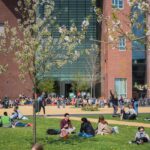The past weeks showed a decline in the student psychologists work pressure. While a temporary stop was put in place in January, the workload is lower at this time, says manager student welfare, Door van der Sloot. ‘The team has been expanded, which makes a big difference, but fewer students reach out as well.’
How come its quieter?
‘The first few weeks of the corona crisis were hectic. There was much uncertainty and a sense of panic. Will airfare be compensated? Will my side-job stay? What is allowed, and what not? Some students have cancelled their housing and have moved back in with their parents. There is still uncertainty: how long will this take? What will happen after the summer? But, despite the uncertainties, people have become used to the situation.’
‘Now that people have become accustomed, you see students starting to settle down. Not much is happening, so there is no FOMO (fear of missing out -Ed.). This eliminates one of the problems from before the crisis. The feeling of having to do everything -work and study and a thriving social life- is much less now.’
Do students experience different issues now than before the corona crisis?
‘I asked the student psychologists about this and asked them whether the problems they see now differ from the issues before corona. There are no marked differences. Naturally, the current situation causes uncertainty and some additional stress. But these are mostly issues that were already present and are currently exacerbated. What we have noticed is an increase in issues of loneliness and homesickness, as well as concern for far-removed family members. These issues are prevalent in international students. We have recruited a temporary Spanish psychologist specialised in these issues. She will be offering online training on homesickness and loneliness. We have also launched an online platform where students, study and student association can reach out to each other, and where they can inspire and support each other. Students can post their own content, such as tips for social activities and how to stay fit.’
Some students feel that the study load could be lowered in these uncertain times. Is it fair that the study load remains unaltered?
‘That is a difficult question. I can’t judge the amount of course material as I am not involved in education. We strive to keep as much going as possible, to prevent falling back. I feel that teachers are taking the current situation into account. Still, at the same time, I see students struggling to find a new structure. Doing everything from home requires some getting used to for everyone. Finding a new balance is challenging. Some teachers are very concerned; others leave the students to their own devices. That is the same as always, but, when the normal structure is absent, this causes problems.’
‘Martijn van der Spoel will offer a masterclass studying, structure and procrastination in May. It will be a course on Brightspace in four webinars, open to all. By signing up, you commit to structuring your life in several ways during a month.’

 Photo: Shutterstock
Photo: Shutterstock 

